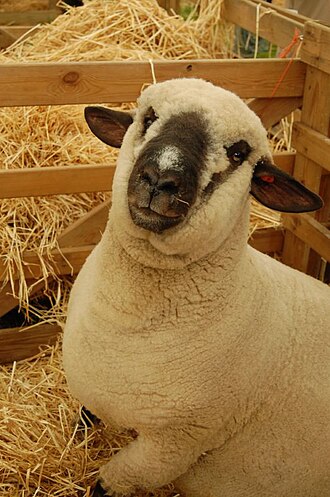|
|
| (15 intermediate revisions by 3 users not shown) |
| Line 1: |
Line 1: |
| − | <!-- Image with unknown copyright status removed: [[Image:2005NAILEchampionShropshireram.jpg|thumb|Caption]] --> | + | <noinclude><translate><!--T:1--> |
| − | The '''Shropshire breed of [[sheep]]''' originated from the hills of [[Shropshire]], and North Staffordshire, [[England]], during the [[1840]]'s. The breeders in the area used the local horned black-faced sheep and crossed them with a few breeds of white-faced sheep ([[Southdown (sheep)|Southdown]], [[Cotswold sheep|Cotswold]], and [[Leicester (sheep)|Leicester]]). This produced a medium sized polled (horned) sheep that produced good [[wool]] and meat. In [[1855]] the first Shropshires were imported into the United States (Virginia).
| + | </noinclude> |
| | | | |
| − | In [[1859]] the breed was officially recognized by the [[Royal Agricultural Society]] as being a distinct breed. The popularity of the Shropshire breed grew rapidly in [[England]], and in [[1882]] Shropshire breeders founded the [[Shropshire Sheep Breeders' Association]] and [[Flock Book Society]], the world's first such society for sheep. The Society still survives.
| + | <!--T:2--> |
| | + | {{ |
| | | | |
| − | By [[1884]] more Shropshires were exhibited at the local shows than all other breeds combined. The first documented flock in the [[United States]] (one ram and twenty ewes) was brought to [[Maryland]] in [[1860]] by [[Samuel Sutton]]. Thousands of Shropshires were exported to the United States after that, as well as to other parts of the English speaking world, notably [[Australia]] and [[New Zealand]], and to [[South America]]. The breed's adaptability to most environments and their dual-purpose nature led to them quickly becoming a popular breed.
| + | <!--T:3--> |
| | + | Breed id |
| | + | |name = Shropshire |
| | + | |image = Dark-faced Norfolk sheep.jpg |
| | + | |description = |
| | + | The '''Shropshire breed of sheep''' originated from the hills of Shropshire, and North Staffordshire, England, during the 1840's. The breeders in the area used the local horned black-faced sheep and crossed them with a few breeds of white-faced sheep (Southdown, Cotswold , and Leicester). This produced a medium sized hornless sheep that produced good wool and meat. |
| | | | |
| − | In [[1884]] the [[American Shropshire Registry]] was formed and by the turn of the century the Shropshire was the most numerous breed of sheep in the United States.
| + | <!--T:4--> |
| | + | The breed's adaptability to most environments and their dual-purpose nature led to them quickly becoming a popular breed. |
| | | | |
| − | By the [[1930]]s the Shropshire had been dubbed "the farm flock favorite". But in the [[1940]]s the breeders began producing Shropshires with more wool cover and decreased size. This lead to the breed having increased wool cover around the eyes, and thus needing to be trimmed around the eyes for better sight. This hindrance and overall loss of size led to the numbers of the breed decreasing among American farmers. They were no longer the most popular breed of sheep, and became increasingly rare around the world, even in its homeland.
| + | <!--T:5--> |
| | + | Today's modern Shropshire isone of the most numerous breeds of sheep (especially in the mid-west). Its gentle nature and medium size makes it very popular with 4H exhibitors. The mature weights for Shropshire rams is between 225 to 250 pounds and between 150 to 180 pounds for the females. |
| | | | |
| − | In the [[1950]]s some progressive Shropshire breeders began going back to the original traits that made the breed so popular. The imported some select open faced Shropshire rams from England with larger size. They helped to once again produce a breed of sheep with medium size and good wool and meat production. The Shropshire again became an increasing popular breed among farmers with their ability to adapt to varying environments.
| + | <!--T:6--> |
| − | | + | }} |
| − | Today's modern Shropshire is once again one of the most numerous breeds of sheep (especially in the mid-west). Its gentle nature and medium size makes it very popular with 4H exhibitors. The mature weights for Shropshire rams is between 225 to 250 pounds and between 150 to 180 pounds for the females.
| + | <noinclude></translate></noinclude> |
| − | | |
| − | ==See also==
| |
| − | *[[Domestic sheep]]
| |
| − | *[[Guard llama]], llamas used as livestock guardians.
| |
| − | *[[Sheep shearing]]
| |
| − | *[[Wool]]
| |
| − | | |
| − | ==Sources==
| |
| − | * The American Shropshire Registry Association, Dale E. Blackburn - Executive Secretary, PO Box 635 Harvard, IL 60033
| |
| − | * Breeds of Livestock, Oklahoma State University web site
| |
| − | | |
| − | [[Category:Sheep]]
| |
| − | | |
| − | [[de:Shropshire (Schaf)]]
| |

